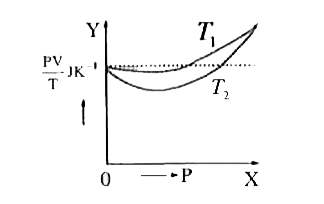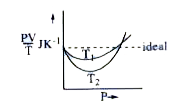The temperature of an ideal gas is increased from 120 K to 480K. If at 120 K the root mean square velocity of the gas molecules is v , at 480 K it becomes Solution in Telugu
4v
2v
v/2
v/4
The correct Answer is:B
Step by step video, text & image solution for The temperature of an ideal gas is increased from 120 K to 480K. If at 120 K the root mean square velocity of the gas molecules is v , at 480 K it becomes by Physics experts to help you in doubts & scoring excellent marks in Class 11 exams.
Updated on:21/07/2023Topper's Solved these Questions
- KINETIC THEORY OF GASESBOOK - AAKASH SERIESCHAPTER - KINETIC THEORY OF GASESEXERCISE - Problems
12 Videos
- KINETIC THEORY OF GASESBOOK - AAKASH SERIESCHAPTER - KINETIC THEORY OF GASESEXERCISE - Exercise -I
50 Videos
- KINETIC THEORY OF GASESBOOK - AAKASH SERIESCHAPTER - KINETIC THEORY OF GASESEXERCISE - EXERCISE-3(Kinetic Theory of an ideal gas)
4 Videos
- KINEMATICSBOOK - AAKASH SERIESCHAPTER - KINEMATICSEXERCISE - ADDITIONAL PRACTICE EXERCISE (PRACTICE SHEET (ADVANCED)) (Integer Type Questions)
12 Videos
- LAWS OF MOTIONBOOK - AAKASH SERIESCHAPTER - LAWS OF MOTIONEXERCISE - PRACTICE EXERCISE
108 Videos
Similar Questions
Figure shows plot of PVT and P for 2gm of oxygen gas at two different temperatures

(i) The significance of dotted line
(ii) The relation between T1andT2
(iii) The value of PVT where the curves meet on the x-axis.
View SolutionAt constant volume, temperature is increased. Then
View SolutionGiven is the graph between PV/T and P for 1 gm of oxygen gas at two different temperature T1 and T2 (Given:Density of oxygen=1.429kg/m3).The value of PV/T at the point A and the relation between T1 and T2 and respectively

View SolutionThree particles start from origin at the same time: one with velocity v1 along positive x - axis, the second along the positive y-axis with a velocity v2 and the third along the line y=x with such a speed that all the three always stay in a straight line, then the velocity of the third particle is √kV1V2(V1+V2).
View SolutionA force of 50 N acts on a body of mass 10 kg at rest. Its velocity after 5 seconds if the same force acts, is
View SolutionThe temperature of an ideal gas is increase from 120 K to 480 K. If at 120 K the rms velocity of the gas molecules is v, then what will be its rms velocity at T = 480K?
View SolutionThe temperature of an ideal gas is increased from 120K to 480K. If at 120K the root-mean-square velocity of the gas molecules is v, at 480K it becomes:
View SolutionThe temperature of an ideal gas is increased from 120 K to 480 K. If at 120 K the root mean square velocity of the gas molecules is v, at 480 K it becomes
View SolutionThe temperature of an ideal gas is increased from 120 K to 480 K. If at 120 K the root mean square velocity of the gas molecules is v, at 480 K it becomes
View SolutionThe temperature of an ideal gas is increased from 120K to 480 K. IF a 120 K the rms speed of the gas molecules is v then find out the rms speed at 480K.
View SolutionThe temperature of an ideal gas is increased from 120K to 480K: If at 120K, the root mean square speed of the gas molecules is 'v' then at 480K it will be
View SolutionThe temperature of an idea gas is increased from 120 K to 480 K. If at 120 K the root mean square velocity of the gas molecules is ν, at 480 K it becomes
View SolutionThe temperature of an idea gas is increased from 120 K to 480 K. If at 120 K the root mean square velocity of the gas molecules is ν, at 480 K it becomes
View SolutionThe temperature of an ideal gas is increased from 120 K to 480K. If at 120 K the root mean square velocity of the gas molecules is v , at 480 K it becomes
View SolutionThe temperature of an ideal gas is increased from 120 K to 480 K. If at 120 K the root mean square velocity of the gas molecules is v, at 480 K it becomes
View Solution
